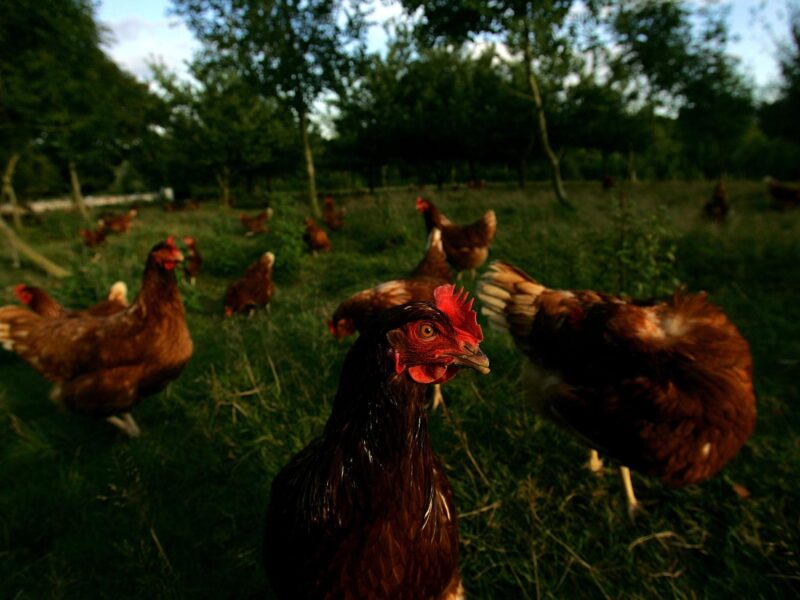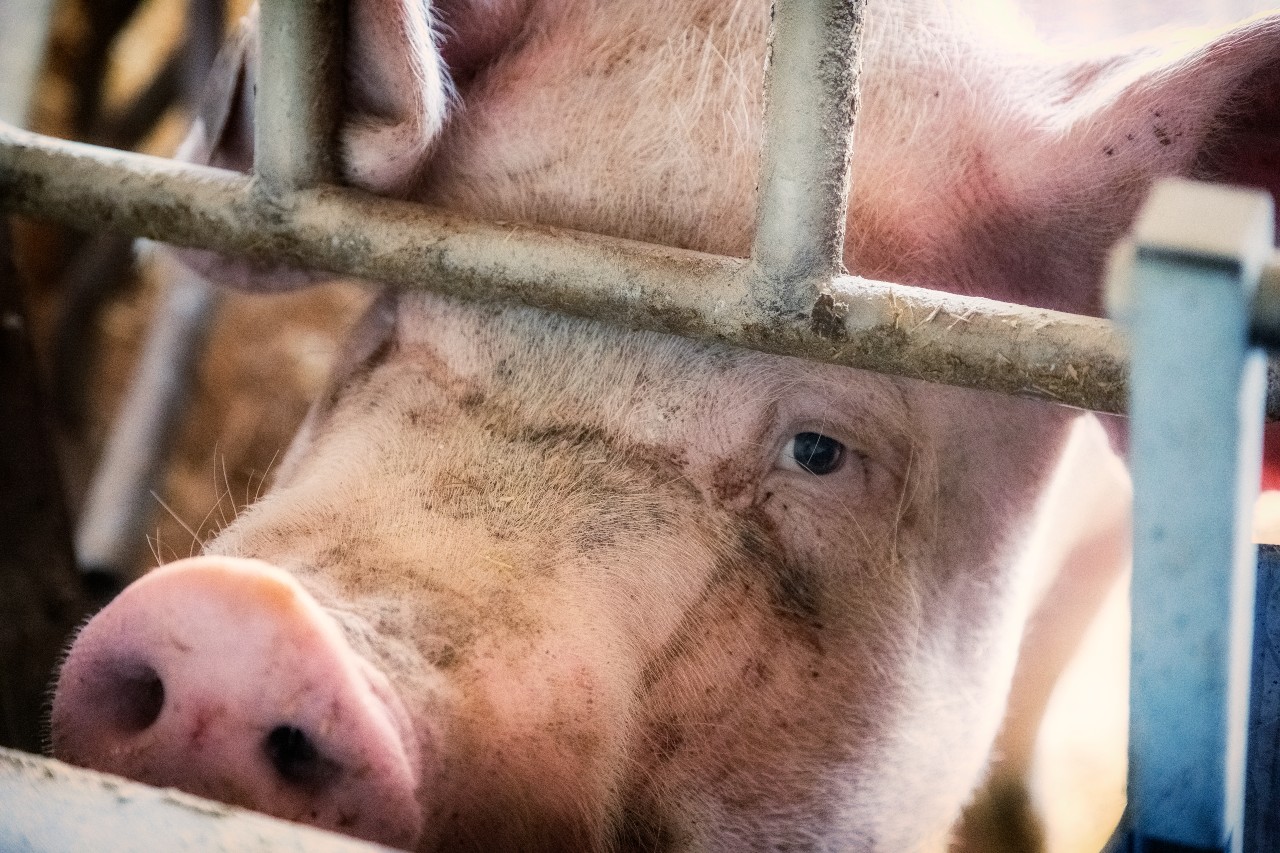
COP – a missed opportunity to fix our broken food systems
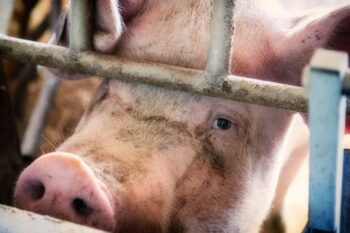
Factory farmed pigs are confined in cages and prevented from going outdoors | Credit: Jerome Genee
This year’s UN climate change conference – COP27 – took place in Sharm-el-Sheikh in Egypt and ran into overtime as negotiators struggled to agree commitments to tackle the climate emergency.
Compassion sent a delegation of five to this year’s conference with the aim of raising awareness of the vital yet overlooked need to end industrial agriculture in order to meet climate targets.
Leading the delegation was Debbie Tripley, our Global Director of Campaigns and Advocacy. Debbie leads our high-profile international campaigns and advocacy work to end factory farming and transform our global food system. A practising environmental lawyer for many years, Debbie joined Compassion earlier this year, having spent eight years at WWF as Director of Environmental Advocacy and Policy.
Here, Debbie shares her thoughts on what was achieved at COP27 and what more needs to be done for the sake of animals, people and our planet.
Fixing our broken food system
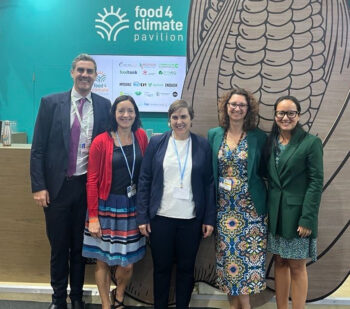
The Compassion in World Farming delegation outside the Food4Climate Pavilion | Credit: Compassion in World Farming
Put simply, unless we end factory farming and fix our broken food system we won’t be able to avert a climate disaster. The livestock sector produces more greenhouse gases (GHGs) than the direct emissions of all the world’s planes, trains and cars put together. And the beef industry alone produces the same emissions as the construction sector.
Research shows that, without action, GHGs from food and agriculture will increase substantially and make it almost impossible to reach the Paris Agreement targets and our Sustainable Development Goals (SDGs).
As the goal of ensuring the planet warms no more than 1.5°C is further out of reach, global food system transformation should be firmly and urgently on our world leaders’ agendas, not a side issue that is continuously pushed to the fringes of debate.
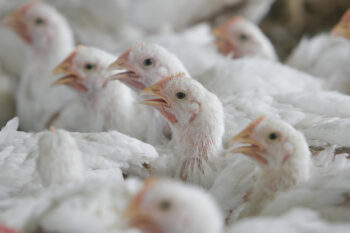
“The livestock sector alone produces more greenhouse gas emissions than the direct emissions of all the world’s planes, trains and cars put together.” | Credit: Martin Usborne / CIWF
With this in mind, Compassion in World Farming sent a delegation to COP27 in Sharm-El-Sheikh determined to highlight the urgent yet overlooked need for world leaders to step up and take action. Whilst food systems was not a topic of debate in the negotiated process itself, it was discussed extensively on the fringes of COP.
For the first time, the UN climate change conference was hosting several pavilions – or large stands – focused on raising awareness of food systems and agriculture with many people from NGOs to indigenous communities talking about their experiences. And since COP26, more people seemed to be making the links between the way we produce our food and the growing climate and nature emergencies. Perhaps this also explained what felt like the growing presence this year of big food business hosting side events within their own Food Pavilion, showcasing an array of business solutions on the future of agriculture and to food security.
Food4Climate Pavilion – a focus for food systems issues
Along with more than 20 NGO and other partners, Compassion in World Farming co-hosted one of these pavilions – the Food4Climate Pavilion – which was dedicated solely to highlighting food systems issues. With partners including Food Tank, FOUR PAWS, ProVeg International and IPES-Food, the pavilion hosted a busy schedule of daily and well attended side-events on topics ranging from alternative proteins and the reintegration of indigenous foods into our diets to financing a just transition to sustainable food systems and solutions to reduce food loss and waste. Our team participated actively in a number of lively events on solutions to intensification of factory farming, nitrogen waste management, sustainable livestock management and repurposing agricultural support.
The agriculture industry wants us all to believe that factory farming is necessary to feed our growing world population. Yet, we already produce almost twice the food needed to feed the current population; the problem is that over half is lost or wasted in various ways.
For every 100 calories of human-edible cereals fed to farmed animals, just 17-30 calories enter the human food-chain as meat or milk. Swathes of land in places like the precious Amazon are being deforested to grow crops to feed farmed animals when those calories could be more efficiently fed directly to people.
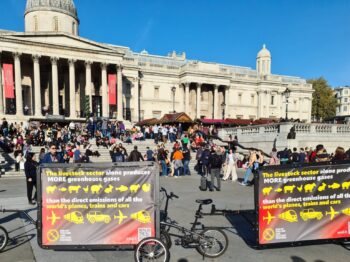
Billboards in Trafalgar Square in London raise awareness of the Greenhouse Gas Emissions produced by the livestock sector | Credit: Compassion in World Farming
The food insecurity we are currently experiencing only highlights further that the system is broken. The first grain train that came out of Ukraine following the invasion did not contain food for humans – but corn for animal feed. With 800 million people going hungry each year, it makes no sense that we are feeding crops to animals to be intensively farmed rather than to people who do not have enough to eat.
Factory farming growing at an alarming rate
Fixing the food system should be one of the easier climate solutions yet it is being downplayed. Instead of investing in regenerative farming – which is climate, nature and welfare-friendly – and adopting predominantly plant-based diets to ensure food security for future generations, our leaders are allowing intensive farming to grow at an alarming rate.
Take for example the recent news from China of a new 26-storey megafarm – a skyscraper of misery housing thousands of pigs in indoor cages that never get to go outdoors. We cannot continue to use animals as machines – not just for the sake of the animals but for our own well-being too. Overcrowded and unhygienic conditions in factory farms increase the risk of pandemics as well as contributing to antibiotic resistance in people.
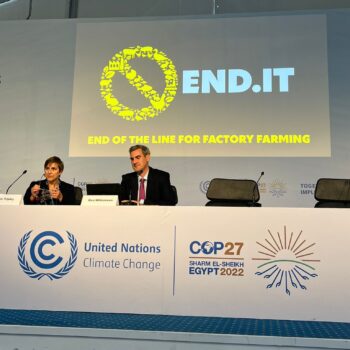
Debbie Tripley launching our End of the Line for Factory Farming campaign at a press conference at COP27 | Credit: Compassion in World Farming
That’s why, at COP27, we also launched a brand new campaign called the End of the Line for Factory Farming. This exciting new initiative will see us build the biggest ever global movement – backed by individuals, forward-thinking companies, high-profile supporters and other NGOs – dedicated to ending this cruel and unnecessary practice and transforming our global food system once and for all.
Our very survival is at threat and there’s no time to lose. With our NGO partners around the world, including World Animal Protection and Eurogroup, we will gather millions of signatures to show world leaders that people around the world demand urgent action to create a food system that benefits animals, people and our planet.
World leaders must deliver urgent action
While progress was made at this year’s conference on the much-needed Sharm-el-Sheikh joint work on implementation of climate action on agriculture and food security, there is so much more to be done. It was disappointing to see food systems not more broadly acknowledged as a whole so building the End of the Line movement to secure action is more important than ever.
We need world leaders to deliver a global agreement on food and farming. This won’t happen overnight – we understand the importance of ensuring a fair transition to help farmers and consumers adapt their livelihoods and lifestyles and protect the rights of indigenous peoples, women, and vulnerable communities. We have a responsibility to achieve a financial and regulatory environment that helps secure a fair transition, and the future without these changes is a far more terrifying prospect.
Together we can make this happen. We need a brighter future for animals, people and the planet – a holistic approach that recognises that the wellbeing of people are intrinsically linked. We are hopeful of a future where nature-positive, higher welfare agriculture supports the regeneration of the environment, fair livelihoods for farmers and nutritious and affordable food for all.
Help us bring factory farming to the End of the Line by joining the movement today at www.END.IT


